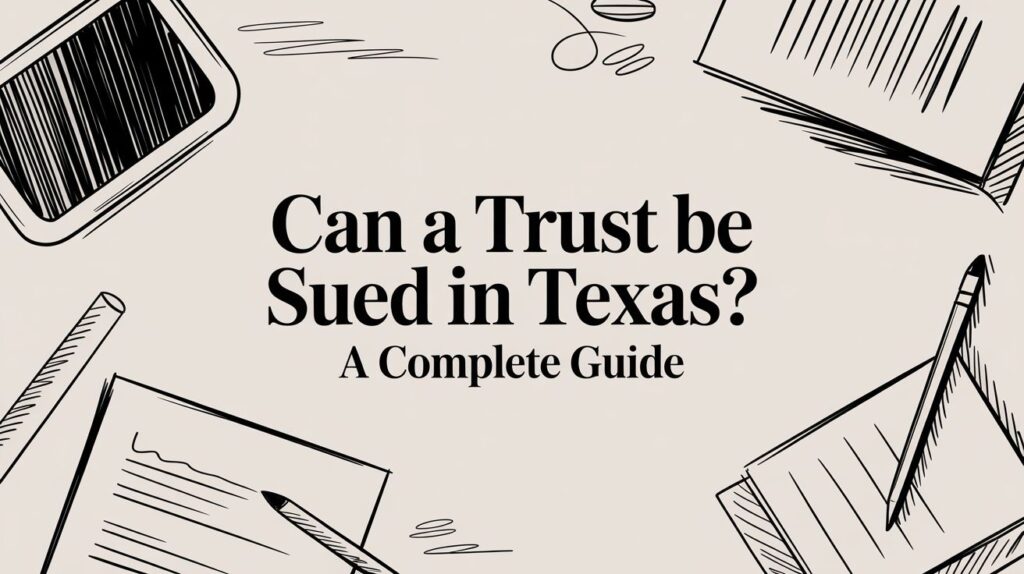Managing a loved one's trust can feel overwhelming, especially when you're caught in a dispute over how it's being handled. It's confusing territory, and one of the first questions that often comes up is, "Can I just sue the trust?"
The short answer is no. Under Texas law, a trust isn't considered a person or a company that you can take to court. It’s more like a legal agreement or a set of instructions created to protect assets.
But that doesn't mean you're out of options. You absolutely can take legal action by suing the trustee—the person or institution in charge of managing the trust. This is the proper legal path to hold the trust accountable and protect your rights as a beneficiary.
Understanding Why You Sue the Trustee, Not the Trust
When you suspect a trust has been mismanaged, it’s easy to see the trust itself as the problem. But legally, a trust is a fiduciary relationship. It's a three-way arrangement between the person who created it (the grantor or settlor), the one managing it (the trustee), and the people it's meant to help (the beneficiaries). The trust is simply the legal container holding the assets.
Think of it this way: if a ship runs aground, you don't sue the ship. You sue the captain who was at the helm.

In this scenario, the trustee is the "captain" of the trust. They are legally responsible for managing it properly and protecting its assets according to Texas law. Because of that responsibility, any lawsuit must be aimed directly at the trustee in their official capacity.
The Trustee is Always the Proper Defendant
So, why is this distinction so important? The Texas Trust Code is very clear: the trustee is the legal representative of the trust. This gives them the power to act for the trust, but it also means they have to answer for those actions in court.
To make this crystal clear, here’s a simple breakdown:
Who Is the Defendant in a Trust Lawsuit?
| Legal Entity | Role in a Lawsuit | Reasoning Under Texas Law |
|---|---|---|
| The Trust | Not a defendant. A trust is a legal arrangement, not an entity that can be sued. | Texas law defines a trust as a fiduciary relationship concerning property, not a separate legal person. |
| The Trustee | The proper defendant. The lawsuit is filed against the trustee in their official capacity. | The trustee has legal title to the trust property and is the only party with the authority and duty to defend the trust. |
Filing a lawsuit against the trustee ensures the case is handled correctly from the start. It also means that if a court rules in your favor, the judgment can be paid out from the trust's assets. Grasping this fundamental concept is the crucial first step for anyone involved in a trust dispute, as it shapes everything that follows. If you're considering taking action, getting familiar with how to contest a trust in Texas is a great next step to understand the process.
Why the Trustee Is the Focus of Legal Action
We've established that you don't sue the trust itself—you sue the trustee. But why is that the case? It all comes down to the incredible amount of responsibility Texas law places on the person or institution managing the trust's assets. This isn't just any responsibility; it's a fiduciary duty, which is the highest and most serious standard of care our legal system recognizes.

A trustee is legally bound to protect the trust's assets and carry out its purpose with absolute loyalty to the beneficiaries. Because the law grants them this special position of power, they are the one who must stand up and answer for the trust's actions.
Fiduciary Duties Under the Texas Trust Code
The term "fiduciary duty" isn’t just a legal phrase; it’s a concrete set of obligations spelled out in the Texas Trust Code. At its heart, a trustee must always put the beneficiaries' interests ahead of their own.
This breaks down into several key responsibilities:
- Duty of Loyalty: This is the cornerstone. The trustee must act solely for the benefit of the beneficiaries. No self-dealing, no conflicts of interest, no exceptions.
- Duty of Prudence: They must manage the trust's property with the same care a reasonably prudent person would use for their own affairs. This means making sensible investments and sound financial choices.
- Duty to Account: A trustee cannot operate in secret. They must keep meticulous records of every transaction and provide clear, regular reports (accountings) to the beneficiaries.
- Duty to Enforce and Defend Claims: It's the trustee's job to pursue money owed to the trust and to defend the trust against any legal claims brought against it.
When a trustee fails in any of these duties, they have breached their fiduciary responsibility—and that is when the door to a lawsuit swings wide open.
Suing in an Official vs. Individual Capacity
It's critical to understand that a trustee can be sued in two different ways: in their "official capacity" or their "individual capacity." The difference is all about whose money is at risk.
Suing a trustee in their official capacity is like suing the position, not the person. The lawsuit is aimed at the trustee's actions as the manager of the trust. If you win, any damages are usually paid directly from the trust's assets. This is common for contract disputes or disagreements over routine trust administration.
However, if a trustee does something seriously wrong—like stealing from the trust or deliberately mismanaging funds to harm a beneficiary—they can be sued in their individual capacity. This is a much more serious matter. A successful lawsuit means the trustee must pay damages from their own pocket. Their personal bank accounts, home, and other assets are on the line. This holds them personally accountable and protects the trust's assets from being drained to cover their wrongdoing. Knowing which path to take is crucial, and an experienced Texas trust administration lawyer can guide you on the right strategy.
Common Reasons for Suing a Trustee in Texas
When beneficiaries worry that a trust isn't being handled correctly, their concerns usually fall into a few specific legal categories. Under Texas law, these are distinct claims, and figuring out which one applies is the first step toward taking action.
By far, the most common claim is breach of fiduciary duty. This legal principle is the foundation of the trustee's role. When they fail in their duty of loyalty, care, and transparency, they have broken their core promise to the beneficiaries. Our attorneys can offer deeper insights into what a trustee breach of fiduciary duty in Texas truly looks like in practice.
Trustee Mismanagement and Negligence
Not every bad decision a trustee makes is grounds for a lawsuit. But consistent carelessness or negligence is a different story. This is often less about a trustee trying to steal money and more about them simply failing to do their job responsibly.
For example, a trustee who invests all the trust's money into a single, high-risk "meme stock" that crashes has likely failed in their duty to diversify assets prudently. Or consider a trustee who forgets to pay property taxes on a house owned by the trust, racking up penalties that drain the trust's value. These kinds of mistakes directly harm the beneficiaries and can be grounds for legal action.
Misappropriation of Trust Assets
Now we’re moving from carelessness to outright theft. Misappropriation, also known as conversion, is when a trustee treats the trust's assets like their own personal piggy bank. This is a blatant violation of their duty of loyalty.
We've seen cases where a trustee "borrows" from the trust to start a business, uses the trust’s bank account for a lavish vacation, or even buys a new car with the funds. This type of misconduct can fly under the radar for years unless a beneficiary gets suspicious and demands a full accounting.
Challenges to the Trust’s Validity
Sometimes the problem isn't the trustee's actions, but the trust document itself. The argument here is that the trust was never legally valid to begin with. Two major challenges arise in this area:
- Undue Influence: This happens when the person who created the trust (the grantor) was pressured or manipulated into it. For example, an elderly parent being isolated by one child who convinces them to write everyone else out of the trust. The trust wasn't the grantor's true wish; it was the product of coercion.
- Lack of Capacity: This claim argues that the grantor was not of sound mind when they signed the trust documents. If they were suffering from severe dementia or another cognitive impairment that prevented them from understanding what they were signing, the entire trust could be invalidated.
A trustee's duty to protect assets isn't just about stocks and real estate. In our digital age, it also means safeguarding sensitive data. A failure to secure digital assets or beneficiary information can expose a trustee to liability. Data breach-related lawsuits against fiduciaries are on the rise, with some settlements reaching hundreds of millions of dollars.
Navigating the Trust Lawsuit Process Step by Step
Thinking about suing a trustee can be intimidating. But breaking down the legal process into clear stages can make it feel much more manageable. Knowing the road ahead helps you prepare for what's coming.
The First Moves: Demand Letters and Court Filings
The journey rarely starts in a courtroom. Instead, it usually begins with a carefully crafted demand letter from your attorney to the trustee. This formal legal document clearly states the problems—like a breach of fiduciary duty—and demands a specific remedy. That could be anything from a full accounting of the trust's finances to returning stolen assets or even stepping down as trustee.
If the trustee ignores the letter or refuses to cooperate, the next step is filing a formal lawsuit, known as a petition, with the proper Texas court.
This infographic highlights some of the common reasons for taking legal action against a trustee.

As you can see, issues like mismanagement, theft, or signs that the trust was created under duress are often what force a beneficiary’s hand.
Uncovering the Truth: The Discovery Phase
Once the lawsuit is filed, we enter the discovery phase. This is the heart of the investigation, where both sides are legally required to share information and evidence. We have several tools at our disposal during this critical stage:
- Requests for Production: We can demand that the trustee hand over every relevant document, from bank statements and investment reports to emails and meeting minutes.
- Interrogatories: These are formal, written questions that the opposing party must answer in writing, under oath.
- Depositions: This is a formal, out-of-court interview where your lawyer questions the trustee and other key witnesses under oath. Everything said is recorded by a court reporter, creating an official transcript.
In many trust disputes, testimony from depositions can be a goldmine of evidence. Having these recordings accurately transcribed is crucial, and using reliable free transcription software can be a significant help in organizing the case.
Seeking Resolution: Mediation and Trial
Before a case reaches a judge, Texas courts often require mediation. This is a structured, confidential negotiation session led by a neutral third-party mediator. The mediator’s job is to help both sides find common ground and work toward a settlement. It is often a faster, cheaper, and less stressful way to resolve a dispute.
Having a seasoned Texas estate planning attorney in your corner during mediation is essential. They will advocate for your best interests and ensure any proposed settlement is fair.
If mediation is unsuccessful, the lawsuit moves forward to trial. At that point, both sides will present their evidence and arguments to a judge, who will then issue a final, binding decision.
What Happens When You Sue a Trustee? Potential Outcomes and Defenses
When a trust dispute lands in court, it’s a two-sided affair. On one hand, you have the claims brought by the beneficiary. On the other, you have the defenses mounted by the trustee. Understanding both sides gives you a much clearer picture of the legal road ahead.
What Can You Win? Potential Remedies for a Successful Lawsuit
If you, as a beneficiary, successfully prove that a trustee breached their duties, a Texas court has a wide range of remedies to set things right. These remedies are designed to protect the trust and make its beneficiaries whole.
A successful lawsuit can lead to powerful results:
- Trustee Removal: If a judge agrees the trustee is unfit to serve, they can be removed immediately. The court will then appoint a successor to manage the trust properly. You can get a deeper dive into this process in our guide on how to remove a trustee in Texas.
- Monetary Damages: The court can order the trustee to personally repay the trust for any money lost due to mismanagement, bad investments, or other breaches of duty.
- Disgorgement of Profits: If the trustee personally profited from a conflicted transaction, such as selling trust property to their own company, the court can force them to return every penny of that profit to the trust.
- Forced Accounting: If a trustee has been secretive and refused to share financial details, a judge can order them to produce a complete, detailed accounting of every dollar that has come in or gone out of the trust.
How Trustees Fight Back: Common Defenses in Trust Litigation
Of course, the trustee will have their own legal strategies to defend against these claims. A knowledgeable Texas trust administration lawyer will anticipate and counter these defenses.
One of the most common defenses is found within the trust document itself. Many trusts contain an exculpatory clause, which can shield a trustee from liability for simple negligence or an honest mistake. However, this clause will not protect them from gross negligence, bad faith, or intentional wrongdoing.
Beyond the trust's own language, trustees may use other arguments:
- Statute of Limitations: You don't have forever to bring a claim. In Texas, there's typically a four-year window to file a lawsuit for breach of fiduciary duty. If a beneficiary waits too long after they knew (or should have known) about a problem, their case can be dismissed.
- Ratification or Consent: This defense argues, "you said it was okay." If the trustee can prove that the beneficiaries were fully informed about a particular action and gave their approval, they cannot later sue over that same action.
Navigating a lawsuit means building a solid argument backed by evidence. While the specifics of trust law are unique, the general principles of proving a legal case still apply—it all comes down to presenting clear evidence and telling a compelling story to the court.
When You Need to Speak with a Trust Attorney
Trying to make sense of trust law on your own can be overwhelming. These disputes often involve complex family dynamics, high stakes, and significant emotion. This is not a journey you should take alone.
Whether you're a trustee trying to do the right thing or a beneficiary worried that something is wrong, getting legal advice early is the single most important step you can make. It's about protecting your rights and ensuring the trust is handled the way its creator intended.
Knowing when to call a lawyer can be tricky, but some situations are clear signs that you need professional help immediately.
Clear Signs It’s Time for Legal Counsel
If any of these scenarios sound familiar, it’s time to speak with a Texas trust administration lawyer right away:
- You're a Beneficiary and… you've been denied a copy of the trust agreement, your requests for a financial accounting are being ignored, or you suspect the trustee is using trust assets for personal gain.
- You're a Trustee and… a beneficiary has accused you of breaching your duties, you are facing threats of a lawsuit, or you need guidance on a complex decision to ensure you are following Texas law.
Waiting is a gamble you can't afford. Texas has strict statutes of limitation that can permanently bar your claim if you delay. Acting quickly keeps your legal options open and allows you to build your case from a position of strength.
Don't let uncertainty or family tension stop you from getting the guidance you need. A good attorney provides more than just a legal game plan; they offer the clarity and confidence to navigate a difficult situation.
If you are managing a trust, have concerns about how one is being handled, or are working on your own estate planning, contact us at The Law Office of Bryan Fagan, PLLC for a free consultation. Our attorneys are here to provide reliable, Texas-based advice for every step of your journey.
Common Questions About Texas Trust Lawsuits
When you're dealing with a trust, many questions can arise, especially if you suspect something is wrong. Here are answers to a few of the most common ones we hear from our clients.
Can a Beneficiary Sue an Irrevocable Trust?
Yes, absolutely. While the term "irrevocable" sounds permanent, it doesn't give the trustee a free pass to do whatever they want. The trustee still has a strict fiduciary duty to manage the trust according to its terms and for the sole benefit of the beneficiaries.
If a trustee is mismanaging funds, refusing to make required distributions, or failing to act in your best interest, you have the right to take legal action. The lawsuit is filed against the trustee to force them to comply with their duties and hold them accountable for any harm they have caused.
How Long Do I Have to Sue a Trustee in Texas?
Time is a critical factor. In Texas, the statute of limitations for most claims involving a breach of fiduciary duty is four years. The key question is: when does that four-year clock start ticking?
It doesn't always begin the moment the wrongful act occurs. The law often starts the clock when you either discovered the breach or reasonably should have discovered it through due diligence. Because these deadlines are complex and strictly enforced, it's vital to speak with a Texas trust administration lawyer as soon as you suspect a problem. Waiting too long could mean losing your right to bring a claim forever.
Who Pays the Legal Fees in a Trust Lawsuit?
This is a major concern for many people, and the answer depends on the specifics of the case and who wins. A trustee, when acting in their official capacity, can typically use trust funds to pay for the legal costs of defending a lawsuit.
However, if the court finds that the trustee breached their duties, the judge has the power to order them to repay those legal fees to the trust from their own personal funds. On the other hand, if a beneficiary brings a successful lawsuit that benefits the trust (for example, by recovering stolen assets), the court may order their legal fees to be paid from the trust as well.
If you’re managing a trust or planning your estate, contact The Law Office of Bryan Fagan, PLLC for a free consultation. Our attorneys provide trusted, Texas-based guidance for every step of the process. Learn more at https://texastrustadministration.com.







